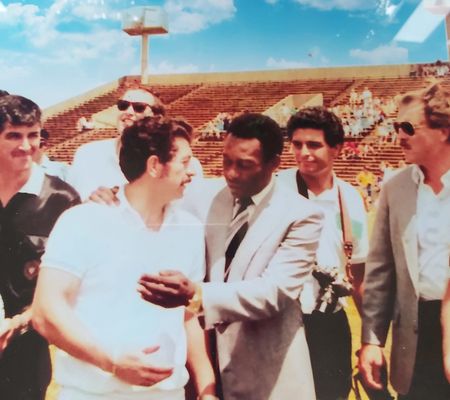Edson Arantes do Nascimento, the man named after the great inventor Thomas Edison, reinvented football as “the beautiful game” through his acrobatics, the excitement of his play, how he commanded the ball with his body and his feet, and how he scored some of the greatest and most beautiful goals in football history. He was an artist on the field.
Pele’s legacy is defined by his ability to bring magic and excitement to the game, and his memorable goals will continue to be remembered for years to come.
Pele was Brazilian football. He was Brazil. He was Santos. For one beautiful decade, with the world and the ball at his feet, Pele was the maximum expression of sport around the planet, well, except perhaps in North America, where football failed to take hold. But, he still caused ripples in the US during his time at the New York Cosmos.
Max Prado, who lived in Silver Spring, Maryland, in the Washington, DC area, met Pele even before his move to The Big Apple. Prado captained a soccer team called Illimani in the semi-pro La Liga DC. The team was made up of Bolivian, Argentine, Mexican and Uruguayan immigrants.
Prado was informed that the Santos team composed of former Brazilian players, including Pele, would be playing against Illimani in DC. It was a hot Saturday afternoon in July when Pele arrived at the field in a chauffeur-driven, blue Mustang sporting a white eagle on the hood. Accompanying him were two bodyguards who stayed in the background but maintained a careful eye on Pele.
Prado was called to the middle of the field. There, Pele, dressed in a light gray suit, white shirt and a dark gray tie with horizontal stripes, stretched out his hand and shook Prado’s hand.
“He spoke Spanish perfectly,” recalls Prado. “‘What is your name? Where are you from?’ asked Pele.”
“Max, from Bolivia.”
“‘I know Bolivia, I have played there. I hope we have a good game, and afterwards we’ll take a refreshment.’” They shook hands again and played a game in which Pele scored all three goals as Santos won 3-1.
It was impossible to mark him, tells Prado whose job in the game was precisely that. “His legs were like machines, I covered him, and he would get the ball and disappear,” he says. “I could not cover him.”
He was a good guy, recalls Prado, “when he would outmanoeuvre me, he would laugh and grab my head,” like childhood pals do.
Pele dominated the ball, he knew where the ball would come, he knew where to put the ball to score a goal, Prado tells the THE WEEK. “He did not look before passing, he knew where the other player would be,” he says. “He never looked at the field or the ball, Pele would run, and the ball ran with him as if his feet had magnets.”
Also read
- Why Pele was much more than what he did on the field
- Pele was football's Einstein
- 'Ah, you are that No. 14': When Pele praised Gautam Sarkar
- A daughter's diary: Instagram posts on Pele by his daughter Kely
- How Pele became a harbinger of change
- When a Las Vegas restaurant came to a halt as Pele walked in
At the end of the game, Pele grabbed the hand of the then-21-year-old, strappingly handsome Prado and gave him the shirt off his back. “We shook hands again after the game and stayed to talk,” remembers Prado. “I gave him my phone number and invited him to my house.”
The next day, Sunday, Pele, dressed casually in blue pants and a gray shirt was at Prado’s door. The two bodyguards stayed in the car.
Over a Bolivian fricassee prepared by Nafta, Prado’s wife, Pele shared with Prado some stories of his life, telling him how when he was a child, they were so poor that he did not have shoes to play and how they used mangoes as balls. He told Prado how when he first arrived at Santos, he still did not have playing shoes and the team had to get some for him.
“He told me how when he got to Santos, he was very afraid to play with such big players at that time,” says Prado. “He said: ‘But I got used to it little by little and I emerged and now I am what I am’.”
He was humble and uncomplicated, recalls Prado. He gave me advice on how to take care of the body in order to play good football. “He did not smoke or drink,” he says. “He only drank water or juice.”
Prado says they kept in touch. He went to see Pele pay at Cosmos and they maintained a friendship, calling each other every five or six months for years.
Old and ageing sports figures, like the old soldiers in General McArthur’s farewell speech, just fade away.
But greatness perdures.
MAJOR SPORTING HONOURS
FIFA World Cup
1958, 1962, 1970
Copa Libertadores
1962, 1963
Intercontinental Cup
1962, 1963
Brazilian league titles
1961, 1962, 1963, 1964, 1965, 1968


